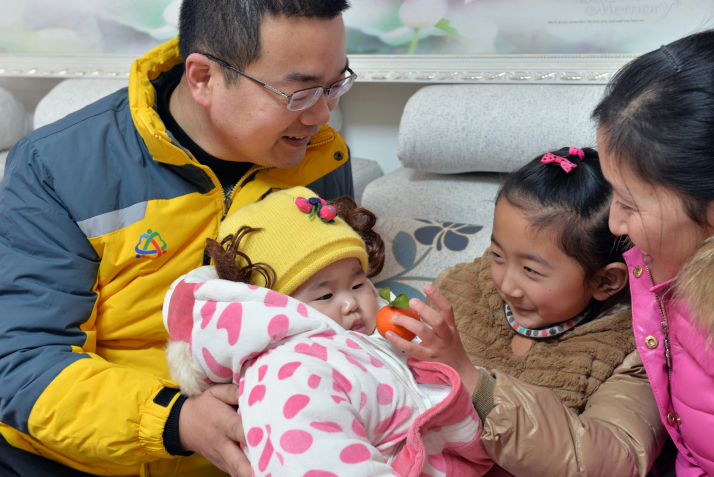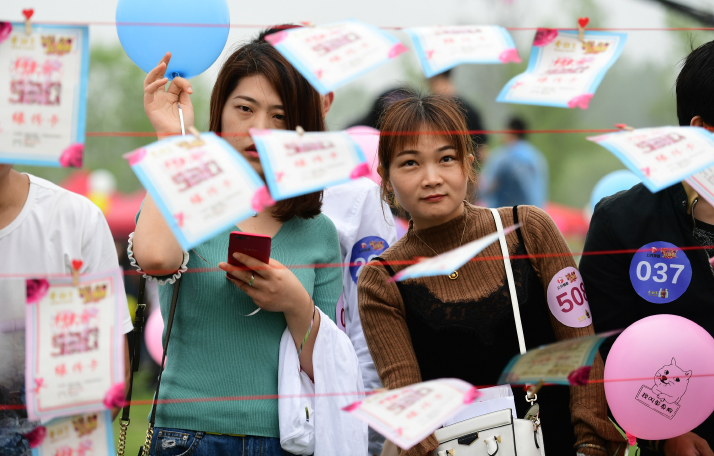|
||||||||||
| Home Nation World Business Opinion Lifestyle ChinAfrica Multimedia Columnists Documents Special Reports |
|
||||||||||
| Home Nation World Business Opinion Lifestyle ChinAfrica Multimedia Columnists Documents Special Reports |
| ChinAfrica |
| More Life Options |
| Chinese women's evolving attitudes toward marriage and childbearing |
| By Hu Fan | VOL.11 March ·2019-03-20 |

The idea of having a second child came to Liu Lili's mind again after she returned from hospital, where her colleague was giving birth. Standing outside the delivery room, she saw family members waiting in anxiety and excitement while good news was conveyed from inside the ward. That reminded her of the happiness she had enjoyed five years ago when her first child was born.
Aged 38, Liu is a civil servant working in Beijing and the mother of a 5-year-old boy. For years, she has been contemplating on having a second child.
The first time she thought about having a second child was in 2016, when China officially ended the one-child policy that had been implemented for more than 30 years and all couples were given the right to have two children. Many of her married friends took it as a benefit and had a second child. Initially, she wanted to follow suit, but after some careful consideration owing to the challenges she previously encountered in raising her first child, she backed out.
She was not the only one hesitating. According to National Bureau of Statistics, after the policy was released, China's population didn't raise as expected. Although the year of 2016 saw the highest number of new births since 2000, the number dropped the next year, and even fewer births were expected for 2018.
At the beginning of this year, news about the negative growth of China's population swept social media. Although no official data is available to support such claims, there is no doubt that China, the world's most populous country, is challenged by the weak growth of its population. The public is concerned about the consequences: the vanishing of the demographic dividend that has made possible China's economic miracle, a population aged but not yet rich, unsustainability of the old-age pension system and so on.
Costs of raising children
Liu is not the single child in her family, she has a younger brother. She wants her son to be able to enjoy share moments just as she experienced with a sibling. For her, giving birth is not the issue although at an age generally believed unsafe for reproduction in China. The problem is raising the child, the challenges of putting one more child through school.
Chinese parents are known for their emphasis on children's education. According to a recent report by Sina, one of China's major web portal, an average Chinese family with a pre-school child spends more than a quarter of its annual income on education, and about 90 percent of these children take extra training courses provided by facilities other than kindergartens.
Liu's son is in an international kindergarten that provides English teaching by native speakers, at a cost much higher than normal kindergarten. But Liu said compared to other parents who send their children to various talent training courses, she is not investing too much money in her child's education. The cost is affordable for the well-off family.
In her case, the pressure is from the time she has to put aside for the children. "Today's children are well educated and multitalented. I can't get rid of the anxiety caused by comparing other infants with mine," she said, adding that to protect her son's self-esteem, it is necessary to help him maintain high academic grades so that he is at par with his classmates. Of course this requires a lot of practice on his part and constant supervision from her as a parent.
"A 5-year-old today can be as multitalented and capable as we were back in our teens, owing to the devotion of parents today. No other shortcut," she said.
Liu admits that she wishes she had more time for activities of interest to her, aside from the ones that only interest her son for the sake of making progress together. She refuses to make herself auxiliary to another person. "I don't think any child would appreciate his or her mother behaving like a nanny. I want to be a mother who is respected by my child. In my opinion, a mother should carry an aurora of respect."
It is apparent to her that age is catching up. "Maybe when my first son is old enough and less dependent on me, I will start a new life."

Finding a Mr. Right
An increasing population of unmarried people is also accountable for the weak population growth. According to Evergrande Institute, in 1990, there were only 460,000 unmarried females and 10 million unmarried males over the age of 30 in China. The numbers in 2015 were 5.9 million and 20 million, respectively. In China, they are labeled "leftover."
Feng Lingxiao is a bank employee in Shenzhen in south China's Guangdong Province. Aged 31, she didn't realize she was "left over" until she found that those men who once had affections for her were all married. Then it became uneasy for her to find a suitable date.
Her friend suggested that perhaps the years she spent attaining postgraduate education may have had something to do with this. It may be true considering that two of her former roommates at that time who were studying for their postgraduates were also single.
A recent report by the Chinese Academy of Social Sciences says females have become the major receivers of higher education since 1999. From 1998 to 2017, females receiving undergraduate and graduate education increased from 38.3 percent to 52.2 percent. This means they start to seriously consider marriage at a later age, with a higher chance of remaining single.
For most women, higher education means less availability to potential mates. In China, women tend to prefer men with a better social status than they have, while men tend to be comfortable otherwise. This means even if there are equal numbers of men and women, the "best" women and the "worst" men are likely to be left over. Among the aforementioned 20 million leftover men, 90 percent of them attained their highest academic qualifications at junior middle school. This means there are not enough "good" men for women with higher academic qualifications to choose from.
This is also the case for Feng, but she doesn't want to make a hasty decision. She believes that marriage requires a lot of responsibility and sacrifice. "I need to find someone I truly like before I am willing to throw myself into the 'sweet cage of marriage.'"
Though she feels lonely from time to time, she enjoys the freedom of being single, because she doesn't have to deal with accommodating another person's schedule, hobbies and lifestyle. On a typical weekend, she wakes up when she feels like, cooks the food she likes most, hangs out and has drinks with friends. She says she often spoils herself on numerous holiday trips destined for anywhere she pleases.
Two years ago, she bought herself a small flat in a very expensive city, and there isn't much left for her to worry about. Most of her life's pressures are only from her parents. "They hope someone can take care of me, although I believe I am doing quite alright on my own."
This may represent the conflict between traditional views about marriage and modern realities. For increasingly independent Chinese women like Feng, perhaps it is high time society took a more open and tolerant approach to embrace diverse life choices. "After all, life is too short. Why do we have to force ourselves into doing things we don't like?" Feng asked.
(Comments to hufan@chinafrica.cn)
| About Us | Contact Us | Advertise with Us | Subscribe |
| Copyright Beijing Review All rights reserved 京ICP备08005356号-5 京公网安备110102005860号 |